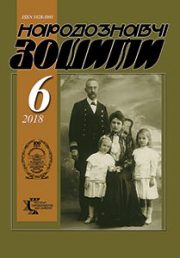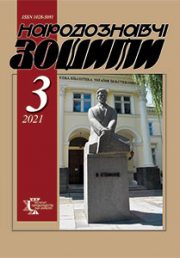The Ethnology Notebooks. 2025. № 4 (184), 920—929
UDK94(44)”17/18″:322
DOI https://doi.org/10.15407/nz2025.04.920
BARAN Zoya
- ORCID ID: https://orcid.org/0000-0001-9685-3953
- Candidate of History, Associate Professor,
- Ivan Franko National University of Lviv,
- Department of World Modern History,
- 1, Universytetska str., 79000, Lviv, Ukraine,
- Contacts: е-mail: zoja_baran@ukr.net
SYPKO Bogdana
- ORCID ID: https://orcid.org/0000-0002-3136-9340
- Candidate of History, Associate Professor,
- The Ivan Franko National University of Lviv,
- Department of World Modern History,
- 1, Universytetska str., 79000, Lviv, Ukraine,
- Contacts: е-mail: bogdanasypko@gmail.com
Abstract. Introduction. The term communautarisme entered in French socio-political discourse at the turn of the ХХ—ХХІ centuries, and is explained as a socio-political project that seeks to subject members of a specific group to norms that are considered inherent to this community, that is, to control the thoughts, beliefs, and behavior of everyone who belongs to this group.
Problem Statement. Despite the fact that communitarianism is a neologism, we believe that the religious policy of France during the Revolution’s era (1789—1871) was determined precisely by the desire to overcome the imaginary religious communitarianism.
Purpose is on the basis of the works of enlighteners, constitutional acts, as well as the achievements of modern historiography, to analyze how the French authorities tried to deprive it of the signs of communitarianism.
Methods. The general scientific methods of analysis and synthesis, as well as special scientific comparative-historical and chronological methods are used in the work. The authors adhere to the principle of historicism.
Results. Under the influence of the ideas of Voltaire and Rousseau, the revolutionaries viewed Christianity as a religion that weakened the ties of the individual with society, because it created a community whose interests were supposedly placed above the needs of the French people and were under foreign influence. Therefore, at first they tried to «adapt» Christianity and in the conditions of strengthening of anti-French coalitions, Christians were accused of a lack of patriotism and were created new cults — of Reason, which later was transformed into the cult of the Supreme Being. Since the population did not accept these experiments, Thermidorians returned to the «normalization» of Christianity. The Concordat of 1801 consolidated the main achievement of the revolutionaries — the Catholic religion ceased to be the state religion and at the same time got rid of foreign influences. The following constitutional acts took into account these realities.
Conclusion. The fight against communitarianism, de facto initiated at the end of the XVIII century, later resulted in the concept of secularism in religious policy, and in assimilation in immigration policy.
Keywords: age of Revolutions, communitarianism, Constitution, Napoleon, Enlightenment, religious politics, secularism, France.
Received 5.07.2025
REFERENCES
- Le communautarisme. Retrieved from: https://dictionnaire.lerobert.com/ definition/communautarisme (Last accessed: 02.06.2025) [in French].
- Dhume, F. (2018). Communautarisme, a mutant category. Communautarisme? Paris: PUF. Retrieved from: https://laviedesidees.fr/IMG/pdf/ 20180925_communautarismedhume.pdf (Last accessed: 02.06.2025) [in French].
- (2005). Around communautarisme. Les Cahiers du CEVIPOF, 43 [in French].
- Mostfa, A. (2017). Communaute and communautarisme. Terminological journey and historical destinies. Building community remotely from the communautarisme (Pp. 18—26). Lyon: Chronique sociale [in French].
- Sypko, B. (2022). The policy of institutionalization of laicism in French Republic at the beginning of the 21st century. EMINAK: naukovyi shchokvartalnyk, 1 (37), 120—134. DOI: 10.33782/eminak2022.1(37).576 [in Ukrainian].
- Aulard, A. (1892). The Cult of Reason and the Supreme Being (1793—1794). Paris: Felix Alcan Editeur [in French].
- Langlois, C. (2010). Policies and Religion in France in XIX centurie. Naukovi zapysky Ukrainskoho katolytskoho universytetu. Seriia Istoriia, 1 (Issue II, pp. 85—114) [in French].
- Boutry, P. (2004). De-Christianization of the French Revolution and the Re-Christianization of France in the 19th Century. Dukh i Litera, 13—14, 213—226 [in French].
- Escande, R. (2008). The Black Book of the French Revolution. Paris: Les Editions du CERF [in French].
- Baran, Z. (2023). Workshop on the course «History of Western Europe and North America in the Modern Era». For students of the Faculty of History. Part One. Lviv: Ivan Franko National University of Lviv [in Ukrainian].
- Voltaire. (2024). Treatise on Tolerance. Quebec: Bibliotheque electronique du Quebec (Vol. 1315) [in French].
- Rousseau, J.-J. (2001). On the social contract, or the principles of political law. Kyiv: Port-Royal [in Ukrainian].
- Declaration of the Rights of Man and of the Citizen of 1789. Retrieved from: https://www.conseil-constitutionnel.fr/le- bloc-de-constitutionnalite/declaration-des-droits-de-l-homme-et-du-citoyen-de-1789 (Last accessed: 03.06.2025) [in French].
- Constitution of 1791. Retrieved from: https://www.conseil-constitutionnel.fr/les-constitutions-dans-l-histoire/constitution-de-1791 (Last accessed: 03.06.2025) [in French].
- Constitution of June 24, 1793. Retrieved from: https://www.conseil-constitutionnel.fr/les-constitutions-dans-l-histoire/constitution-du-24-juin-1793 (Last accessed: 03.06.2025) [in French].
- Constitution of 5 Fructidor Year III. Retrieved from: https://www.conseil-constitutionnel.fr/les-constitutions-dans-l-histoire/constitution-du-5-fructidor-an-iii (Last accessed: 03.06.2025) [in French].
- Constitution of 22 Frimaire Year VIII. Retrieved from: https://www.conseil-constitutionnel.fr/les-constitutions-dans-l-histoire/constitution-du-22-frimaire-an-viii (Last accessed: 03.06.2025) [in French].
- Constitution of 16 Thermidor Year X. Retrieved from: https://www.conseil-constitutionnel.fr/les-constitutions-dans-l-histoire/constitution-du-16-thermidor-an-x (Last accessed: 03.06.2025) [in French].
- Constitutional Charter of June 4, 1814. Retrieved from: https://www.conseil-constitutionnel.fr/les-constitutions-dans-l-histoire/charte-constitutionnelle-du-4-juin-1814 (Last accessed: 03.06.2025) [in French].
- Triomphe, P. (2012). Rethinking the Limits of Politics and Religion during the Restoration: The Contribution of the Controversies Generated by Religious Conversions. Cahiers d’études du religieux. Recherches interdisciplinaires, 10. Retrieved from: http://journals.openedition.org/cerri/1035; DOI: 10.4000/cerri.1035 (Last accessed: 03.06.2025) [in French].
- Constitutional Charter of August 14, 1830. Retrieved from: https://www.conseil-constitutionnel.fr/les-constitutions-dans-l-histoire/charte-constitutionnelle-du-14-aout-1830 (Last accessed: 03.06.2025) [in French].
- Constitution of 1848, Second Republic. Retrieved from: https://www.conseil-constitutionnel.fr/les-constitutions-dans-l-histoire/constitution-de-1848-iie-republique (Last accessed: 03.06.2025) [in French].
- Constitution of 1852, Second Empire. Retrieved from: https://www.conseil-constitutionnel.fr/les-constitutions-dans-l-histoire/constitution-de-1852-second-empire (Last accessed: 03.06.2025) [in French].
- Constitution of 1875, Third Republic. Retrieved from: https://www.conseil-constitutionnel.fr/les-constitutions-dans-l-histoire/constitution-de-1875-iiie-republique (Last accessed: 03.06.2025) [in French].





